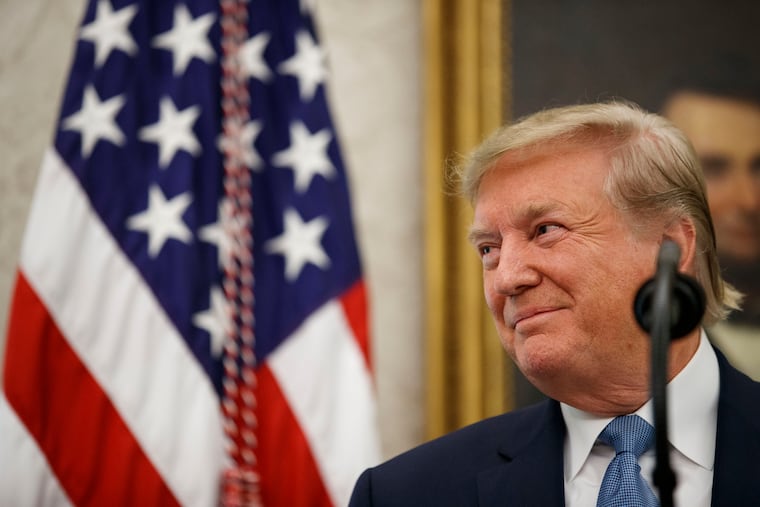Mr. President, a tweet could end your trade war and avoid recession. But hurry. | Opinion
The risks of recession could be dispelled quickly if President Trump were to strike some kind of face-saving arrangement with President Xi of China to de-escalate the trade war.

The risk of recession is uncomfortably high and rising. President Donald Trump’s trade war is the proximate cause of what ails the economy. Indeed, if the president follows through on his most recent threat to raise tariffs on Chinese imports, the odds of a downturn between now and this time next year are better than even.
The economy’s growth has already slowed sharply. Real GDP and job growth have throttled way back from this time last year, and unemployment is no longer declining.
The slowdown is due, in part, to the winding down of the deficit-financed tax cuts. The president had argued that the tax cuts, which went mostly to corporations and wealthy households, would significantly lift long-term growth. Not so. The stimulus from the tax cuts has already faded.
But the economy’s growing struggles are increasingly about the president’s trade war. The most direct hit to the economy is from the tariffs. They act as a significant tax increase on American businesses and consumers.
Retaliation by the Chinese has also hurt. This includes tit-for-tat tariffs on U.S. products imported into China, a near ban on purchases of U.S. agricultural products, and various administrative efforts that complicate the activities of U.S. companies doing business in China.
Most serious may be the fallout of the trade war on business sentiment and investment. Businesses across the globe are anxious. This is clear in surveys ranging from the German Ifo and Japanese Tankan to Duke University’s recent survey of CFOs of U.S. companies, two-thirds of which believe that there will be a recession before the end of the president’s term.
What is giving businesses so much agita is the uncertainty created by the trade war. Which products from which countries will have a higher duty? Is the tariff 10 percent, or will the president lose his temper and increase it to 25 percent? How long will the higher tariffs remain in place? And which companies will be the lucky beneficiaries of a Trump administration waiver on paying the tariffs?
Given all these unanswered questions, businesses are sitting on their hands. They won’t make big investments. And manufacturers, ag-related industries, and transportation and distribution companies that depend on global trade have pulled back on hiring.
President Trump has tried to cushion the economic blow to farmers by promising billions in aid, but it is unclear how this is being distributed. The administration has also allowed U.S. companies harmed by the tariffs to petition the government for tariff exemptions. However, this has been a cumbersome, slow and capricious process, and it smacks of crony capitalism.
As the president has grown more worried about recession prospects, he has increased his criticism of the Federal Reserve and insistently brow-beats the Fed to lower interest rates more aggressively. He is now even talking about a temporary cut in payroll taxes.
Trump’s escalation of the trade war has also undermined global investor confidence. Stock prices are down, but more telling, global interest rates have plunged. The Treasury yield curve has inverted. That is, short-term interest rates are higher than long-term rates, a very unusual occurrence, which is historically a fool-proof leading indicator of recession.
It wouldn’t take much for the trade war to precipitate a recession. If there is any further slowing in growth, unemployment will rise. This is the fodder for recession. That’s because U.S. consumers, who to date have been largely financially untouched and oblivious to the trade war, will begin to feel its effects. This will dim consumers’ confidence and their spending. Already skittish businesses, which have been on the front line of the trade war, will pull back even more on their investment and hiring and may even start laying off workers. Consumers will see this and become more nervous and cautious. The vicious cycle that characterizes a recession will take hold.
The most accurate indicator that a recession has begun is a quarter percentage point increase in the unemployment rate over a three month period. This magnitude increase in unemployment in such a short period has historically been too much for consumers and the broader economy to bear.
The Federal Reserve will work hard to avoid a downturn by cutting rates, but it will be difficult for the Fed to successfully calibrate its rate cuts. With Trump’s trade policy lurching back and forth, it wouldn’t be surprising if the Fed miscalculates in setting policy.
The risks of recession could be dispelled quickly if Trump were to strike some kind of face-saving arrangement with President Xi Jinping of China to de-escalate the trade war. While this seems increasingly unlikely, given recent events, and thus the high and rising odds of recession, Trump has shown that he is willing and able to do a 180 on his policies with a tweet. We need that tweet pretty soon.